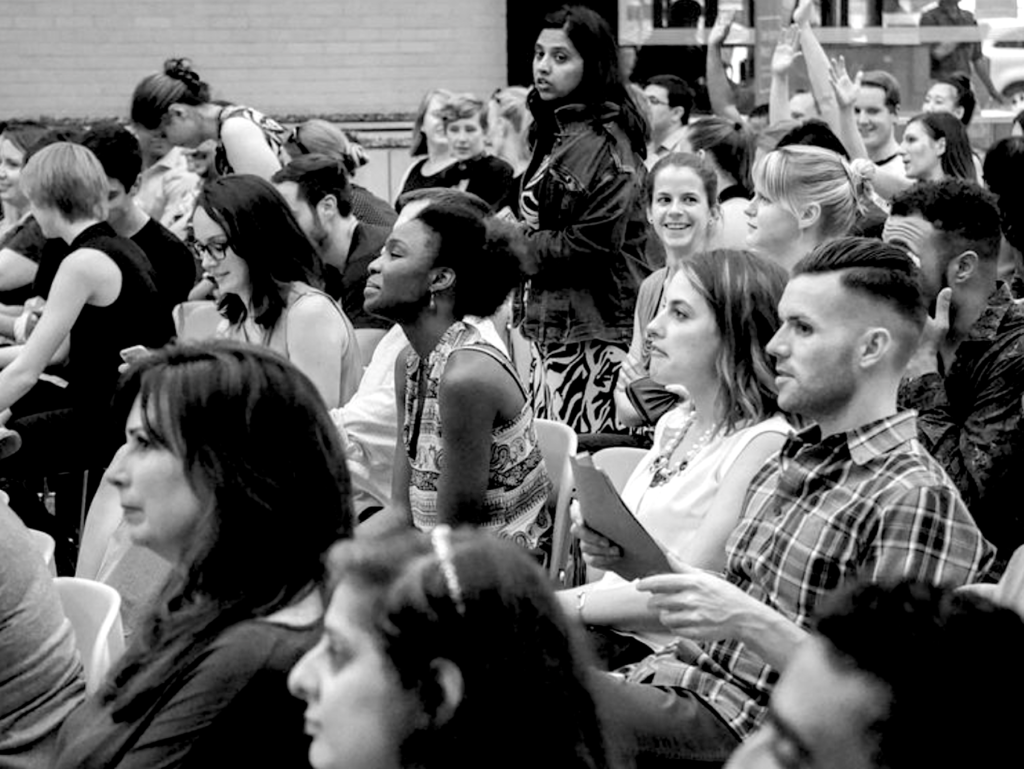May 2012
Every month, D.C. technologists, investors, and entrepreneurs gathered together for discussions, lightning talks, and demos. #DCtech. With over 25,000 members, the event was usually held at a large auditorium such as the historic Synagogue on 6th and I St. or the Martin Luther King Jr. Library.
On Tuesday, May 1st D.C. Tech was hosting a “Hacks, Code and Creative” meetup at the Synagogue. I decided to arrive early to pass out stickers and shades to attendees who were arriving.
Peter Corbett, the CEO of iStrategyLabs came storming in. “You can’t do that. I never gave you permission.”
“Why not, it’s just swag.”
“People will get the impression that you’re part of this event. And we have huge sponsors who are forking out tons of money to make this happen.”
“Well, maybe one day I’ll be there. But as for now, we’re just a fledgling startup.”
Peter Corbett is a tireless tech evangelist and the defacto leader for D.C. Startups. Out of a Logan Circle row house in 2007 that quickly won over Fortune 500 clients with his quirky digital marketing campaigns.
He was selected to be a speaker at the World Economic Forum in Davos, Switzerland, where he shared lessons learned from D.C. and had the mayor’s ear on any issues relating to tech.
But in a city filled with unvaried lawyers and govvies, he became the jaunty party host, who seemed just as interested in helping find dates as in matching entrepreneurs with each other or with investors.
Peter strode with an air of confidence and controlled the meetup with a strong grip. Everything had to go through him, all decisions, even the minutiae, and woe on to you if you got on his bad side.
While the sanctuary pews are where one learned about breakthrough innovative ideas, it was actually on the booths and bar stools where one got to engage with novel minds.
Inside Penn Social, with an iPad on hand, I was delighted to find Peter in a free moment so I quickly approached him before some other entrepreneur or intern did.
“Peter, I’m so sorry about passing out swag — I didn’t think about your sponsors.”
“No worries. Just don’t do it again.”
“Absolutely not, say I love your innovative beer cooler in your office — it’s a very avant-garde.”
“Yes, in order to grab a Yuengling or Bud Lite, they have to check in on FourSquare.”
I quickly typed into my iPad and showed him the results. “Here are all the pubs in the area that serves traditional Yuengling on draft, Coors, D.C. Brau Corruption, or any brand or type of beer that you’re looking for.”
“Interesting, and I can find a bar that shows football and is playing my favorite teams?”
“Absolutely, it shows you a faceted search result and you can update your profile so when you’re in NYC, it’ll find you similar places nearby.”
“So what do you want from me? An audience?”
On Wed, July 11, I returned to the Synagogue. This time I didn’t need to bring swag. I was scheduled to demo third and before Bennett Richardson the co-founder of Hinge.
“RUNINOut is a custom search engine for restaurants, retail, and attractions in the D.C. Metro area. A lot of people ask us how are different from Google and Yelp.
Imagine the internet being a big, juicy birthday cake. RUNINOut would only be a small slice of that cake. However, if you were to cut through the cake, you will see that while Google and Yelp are broader, RUNINOut is deeper. Cuz it’s not just about finding restaurants based on cuisine and neighborhood. Here you’re looking for a specific dish, the ingredients in that dish, how that dish tastes, and how the restaurant appeals to your preferences.
A lot of people ask us how we make money. Believe it or not, making money is not our #1 priority. That’s because we wanna raise traction — it’s about getting people to recognize our name, to like our brand, and to tell others about what we do.”
The presentation was a lot longer than the 5-minutes that I was provided. And just like at Startup Weekend last year, I was under the gun. There was time for a few questions.
“Is your business model business-to-business (B2B) or business-to-consumer (B2C)?” a fellow entrepreneur, Jeff Tong, asked.
“Both. RUNINOut primarily works closely with restaurants to feature their menu and amenities through our website and events, and the online directory provides specific information to consumers so they can narrow down their choices and customize their profile .”
“Then you should also create restaurant websites,” he suggested. “That will provide another stream of income and your personalized services will become more value-added to their business model.”
“You should also include social media and CRM marketing to the mix,” another attendee said. “Facebook, Twitter, Instagram, MailChimp, you name it.”
“These are awesome ideas. After all, I already have created much of the content, and have become quite familiar with their menus, and customers. Now the next important question – where are we going for happy hour?”

D.C. Tech Attendees